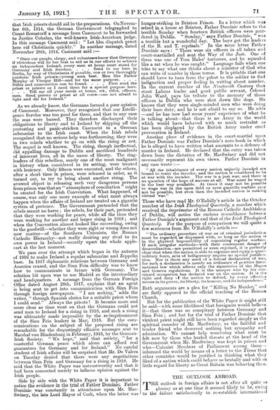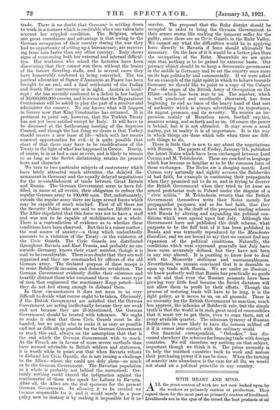THE OUTLOOK ABROAD.
THE outlook in foreign affairs is not after all quite so gloomy as at one time it seemed likely to be, owing to the failure satisfactorily to re-establish international trade. There is no doubt that Germany is settling down to work in a manner which is creditable when one takes into account her crippled condition. The Belgians, whose one great consolation and advantage is that owing to the German occupation of their country during the war they had no opportunity of setting up a bureaucracy, are recover- ing from ruin faster than any other country. Italy shows signs of overcoming both her external and internal difficul- ties. Her workmen who seized the factories have been discovering that they cannot run them without the brains of the former directing staffs, and in several cases they have honourably confessed to being converted. The too poetical adventure of Signor d'Annunzio at Fiume has been brought to an end, and a final settlement of the Italian and South Slav controversy is in sight. Austria is bank- rupt ; she has recently confessed to a deficit in her budget of 30,000,000,000 crowns, and it seems that the Reparations Commission will be asked to play the part of a receiver and administer the country. No one knows what will happen in Greece now that King Constantine has returned. It is pertinent to point out, however, that the Turkish Treaty has not yet been ratified except by Italy. It will have to be discussed at the forthcoming meeting of the Supreme Council, and though the last thing we desire is that Turkey should receive a new lease of life—which with her means renewed opportunities for evil—it is quite possible that short of that there may have to be modifications of the Treaty in the light of what has happened in Greece. Russia, of course, is in as bad a case as ever, and is likely to remain so as long as the Soviet dictatorship retains its present form and character.
We turn to two particular subjects of controversy which have lately attracted much attention—the delayed dis- armament in Germany and the equally delayed negotiations for the re-establishment of trade between Great Britain and Russia. The German Government seem to have ful- filled, in name at all events, their obligation to reduce the regular German army to 100,000 men. But, unfortunately, outside the regular army there are large armed forces which may be capable of much mischief. First of all there are the Security Police who are said to number 150,000 men. The Allies stipulated that this force was not to have a staff and was not to be capable of mobilization as a whole. There is a contradiction of evidence as to whether these conditions have been observed. But this is a minor matter ; the real source of anxiety—a thing which undoubtedly amounts to a violation of the Treaty—is the existence of the Civic Guards. The Civic Guards are distributed throughout Bavaria and East Prussia, and probably no one outside Germany knows their exact number, though it is said to be considerable. There is no doubt that they are well organized and they are commanded by officers of the old German army. The declared purpose of these troops is to resist Bolshevik invasion and domestic revolution. The German Government evidently dislike their existence and heartily distrust those who command them—the same type of men that engineered the reactionary Kapp putsch—but they do not feel strong enough to disband them.
In these circumstances it does not seem to us very difficult to decide what course ought to be taken. Obviously, if the British Government are satisfied that the German Government are acting ineffectually because they are weak and not because they are ill-intentioned, the German Government should be treated with tolerance. We ought to make it clear that these Civic Guards must be dis- banded, but we ought also to make it as easy as possible and not as difficult as possible for the German Government to reach this end, always on the assumption that that is the end which the German Government wish to reach. As the French are in favour of more severe methods than have seemed advisable to British soldiers and statesmen, it is worth while to point out that when Bavaria refuses to disband her Civic Guards, she is not issuing a challenge to the Allies—whom she could not defy alone—so much as to the German Government. The Bavarian population as a whole is probably not behind the movement. Cer- tainly nothing could exceed the indignation against the reactionaries of those who speak for Labour in Bavaria. After all, the Allies are the real sponsors for the present German Government. In allowing it to be created we became responsible for it, and it would surely be a poor policy now to destroy it by making it impossible for it to survive. The proposal that the Ruhr district should be occupied in order to bring the German Government to their senses seems like making the innocent suffer for the guilty, since there are no Civic Guards in the Ruhr Valley. We cannot say what the -difficulties would be in applying force directly to Bavaria if force should ultimately be necessary. On the face of it it would be a better plan than the occupation of the Ruhr. Meanwhile we are quite sure that nothing is to be gained by extreme haste. Our primary object should be to keep a democratic government in the saddle in Germany and to set the country once more on its legs politically and commercially. If we were asked for an example of the right spirit in which to behave towards Germany we should like to point to a copy of the Cologne Post—the organ of the British Army of Occupation on the Rhine—which has been sent to us. The number, which is well produced and excellently illustrated, has from beginning to end no trace of the heavy hand of that sort of authority which is always advertising its importance, its august presence, and its severity. We receive an im- pression mainly of Marathon races, football cup-ties, amateur acting, and so forth and so on. Of course the power is behind, but it is not obtruded. It may seem a small matter, yet in reality it is of importance. It is the way in which things are done which tells when there are diffi- cult things to do. There is little that is new to say about the negotiations with Russia. The papers of Friday, January 7th, published the latest Notes which have been exchanged between Lord Curzon and M. Tchitcherin. These are couched in language which has become so familiar as to be the common form of these exchanges. The Notes are a slanging match. Lord Curzon very naturally and rightly accuses the Bolsheviks of bad faith, for example in continuing their propaganda when they promised not to do so, and in trying to deceive the British Government when they tried to let loose an armed proletariat mob in Poland under the disguise of a " civic militia." M. Tchitcherin retorts that the British Government themselves write their Notes merely for propagandist purposes, and as for bad faith, that they i have shown it in the draft of the proposed trading scheme with Russia by altering and expanding the political con- ditions which were agreed upon last July. Although the Government have not published this draft scheme, what purports to be the full text of it has been published in Russia and was textually reproduced by the Manchester Guardian, and we are bound to say that we cannot find any expansion of the political conditions. Naturally, the conditions which were expressed generally last July have been more accurately defined, but they have not been in any way altered. It is puzzling to know how to deal with the Muscovite shiftiness and unreasonableness. Nevertheless, we remain convinced that it is desirable to open up trade with Russia. We are under no illusions ; we know perfectly well that Russia has practically no goods to sell and that even the Russian peasants have been growing very little food because the Soviet dictators will not allow them to profit by their efforts. Though the process of restoring trade will have to be long, it is the right policy, as it seems to us, on all grounds. There is no necessity for the British Government to sanction, much less approve, the infamies of Bolshevik rule, but the simple truth is that the world is in such great need of commodities that it must try to get them, even to coax them, out of every available quarter. The inhuman tyranny of Russian Bolshevism is more likely to have the corners rubbed off it if it comes into contact with the ordinary world. Our financial correspondent, " Onlooker," has dis- cussed elsewhere the schemes for financing trade with foreign countries. We will therefore say nothing on that subject, important though we think it is. The prime necessity is to help the maimed countries back to work and restore their purchasing power if it can be done. When the turning of scarcity into abundance is the cure for all ills, we would not stand on a political punctilio in any country.































 Previous page
Previous page